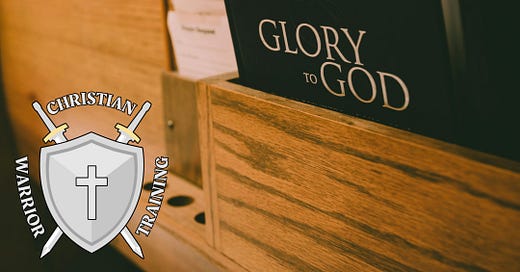The Growing Need for Church Safety Teams
As pastors, one of your primary concerns is creating an environment where people can come to know Christ, grow in their faith, and feel welcomed. This is a sacred responsibility, and it's understandable that anything that might create barriers for newcomers could be seen as a potential threat to that mission. Some may feel that forming a church safety team could make the church appear unwelcoming or overly cautious, potentially scaring off those who are just beginning their journey of faith.
However, we must also recognize the reality that churches today face increasing threats. Whether it’s a targeted attack by individuals or groups intent on causing harm, or other forms of criminal activity, the church is not immune. As the shepherd of your congregation, ensuring their physical safety is just as vital as nurturing their spiritual well-being. In fact, these two responsibilities are deeply intertwined.
I want to explore with you the reasons why forming a church safety team can enhance the welcoming atmosphere of your church, rather than detract from it. We will look at the real threats facing churches today, how a safety team can be integrated seamlessly into your church community, and, most importantly, the biblical perspective on protecting God’s people.
By the end, my hope is that you'll see a church safety team not as a barrier but as a necessary part of fulfilling your calling to care for your flock.
The Threat is Real: Why Churches Are Targeted
Churches across the country are experiencing a rise in targeted attacks. This isn't just hypothetical—it's happening in real time. ISIS has publicly called for its followers to attack Christian churches, and while authorities have managed to prevent some attacks, others have tragically been carried out. The threat is not limited to international terrorist organizations either. Crimes targeting churches—from vandalism to violent assaults—are increasing exponentially.
These crimes aren’t always rooted in religious persecution, but the effect is the same. Congregants, often vulnerable in moments of worship and prayer, are being targeted. In the face of these threats, it is the responsibility of the church to protect its flock. Forming a safety team isn’t about fostering an atmosphere of fear. It’s about creating an environment where the congregation can worship in peace, knowing their safety is being prioritized.
A Welcoming and Safe Environment: How Safety Teams Enhance Church Outreach
Contrary to the belief that a safety team creates a barrier to new followers, it often enhances a church's outreach by providing peace of mind. A well-trained safety team is integrated into the normal operations of the church. They greet newcomers, assist in helping people find their way around, and remain watchful for any signs of trouble.
In most churches, safety teams consist of congregants who already have experience in law enforcement, the military, or security. Many of these volunteers are passionate about protecting the flock and bringing their skills to a ministry role. You don’t need to look far; God has already provided people in your congregation with the abilities to keep others safe. And some of the best safety team members have never served in law enforcement or the military. They simply have a keen sense for detecting threats and a calling to protect others.
In fact, many churches have established safety teams without significant costs. These teams consist of volunteers who are willing to serve, often with minimal equipment. You can also find affordable, church-specific training at ChristianWarriorTraining.com, where we offer courses that teach how to recognize pre-attack indicators and prevent crimes from happening in the first place.
The Biblical Perspective: A Call to Protect God’s People
At the heart of the decision to form a safety team is a biblical mandate to protect God’s people. This isn’t just a practical or worldly concern—it is deeply rooted in Scripture.
Jesus’ Concern for His Followers' Safety
In Mark 3:9, we see an example of Jesus’ care for the physical safety of those following Him. The crowd around Him was growing dangerously large, to the point where they could crush Him and each other. So, Jesus instructed His disciples to prepare a boat, allowing Him to continue teaching from a safer position. This passage shows that even in ministry, Jesus took steps to ensure the safety of those around Him.
Nehemiah's Defense of Jerusalem
Nehemiah is another biblical example of leadership that took physical protection seriously. When rebuilding the walls of Jerusalem, Nehemiah knew they were vulnerable to attacks. In response, he stationed guards at key positions around the wall to protect the workers. Nehemiah 4:9 says, "But we prayed to our God and posted a guard day and night to meet this threat." This example highlights that prayer and action go hand in hand. We trust in God's protection, but we are also called to be vigilant and take measures to safeguard our communities.
Jesus’ Instruction to Arm for Defense
In Luke 22:36, Jesus told His disciples, “If you don’t have a sword, sell your cloak and buy one.” This passage has been interpreted in various ways, but one consistent message is that there are times when self-defense is necessary. Jesus understood that His followers would face danger and that they needed to be prepared.
A few verses later, the disciples respond by saying they have two swords, to which Jesus replies, “That is enough” (Luke 22:38). This detail is important. Jesus didn’t say they needed two purses or two bags—but two swords were sufficient. The emphasis was not on being overly prepared with material goods but on having the means to defend themselves. By highlighting the need for two swords, Jesus was indicating that some form of defense is necessary, but it should be proportionate and purposeful.
The swords served not only as tools for defense but also as a deterrent to those who might intend harm. Just as the disciples' possession of swords communicated that they were prepared, the visible presence of a safety ministry can dissuade potential attackers.
This instruction shows a balanced approach to readiness. While we are called to love our enemies and seek peace, we are not commanded to be passive in the face of imminent threat. Just as Jesus deemed two swords enough to protect His disciples, today’s churches must also be equipped to protect their congregations. Having the right tools to defend isn’t a contradiction of faith—it’s about being wise stewards of those entrusted to our care.
David and the Mighty Men
David, one of the greatest leaders in the Bible, surrounded himself with men of valor who were skilled in battle. In 1 Chronicles 11, we read about David’s "mighty men," warriors who were not only loyal but also prepared to defend David and his kingdom at all costs. This passage speaks to the importance of surrounding the church with those who can protect it from harm.
Other Examples of Protection in Scripture
Throughout the Bible, God’s people are seen taking steps to protect themselves and others from harm. Moses had to make provisions for safety as the Israelites moved through the wilderness. The cities of refuge were established as places where people could flee for protection. Even the wisdom found in Proverbs 22:3 teaches, “The prudent see danger and take refuge, but the simple keep going and pay the penalty.”
These examples serve as a reminder that church safety is not only a practical need but a spiritual responsibility. By forming a safety team, pastors are fulfilling their duty to protect God’s people, just as biblical leaders did throughout history.
Pastoral Care and Responsibility: Protecting the Flock
Pastors, you are the shepherds of your congregation. As shepherds, your role is not only to guide but to protect. Jesus Himself refers to His followers as a flock, and we know that a good shepherd does not allow wolves to devour the sheep. In John 10:11-13, Jesus says, "I am the good shepherd. The good shepherd lays down his life for the sheep." This is the ultimate example of protection and pastoral care.
Creating a safety team is not about instilling fear in your church—it’s about offering protection, just as Jesus protects us. When you provide a safe environment for worship, you allow your congregation to focus on their spiritual growth without the distraction of potential danger. You are showing love, care, and responsibility by ensuring their well-being.
Conclusion: Protecting God’s House
The threats facing churches are real, but so is the power of a well-prepared and vigilant safety team. If you’ve hesitated in forming one, I encourage you to reconsider. You have biblical precedent, the means within your congregation, and the responsibility as a leader to protect your flock. A safety team can enhance the church’s welcoming atmosphere while safeguarding your community from potential harm.
If you’re still unsure how to start, ChristianWarriorTraining.com offers the resources to guide you every step of the way, all of it for FREE. It is my gift to you as a fellow follower of Christ. Start today by taking action to protect God’s people—physically and spiritually. I’ve provided, below, a sample policy that you can use to start making this happen today.







Awesome word Kieth !!!
Thank you
TommyB.😎💪🏻🙏🏻
Sent this to my pastor. They are seeing I am right to be proactive.